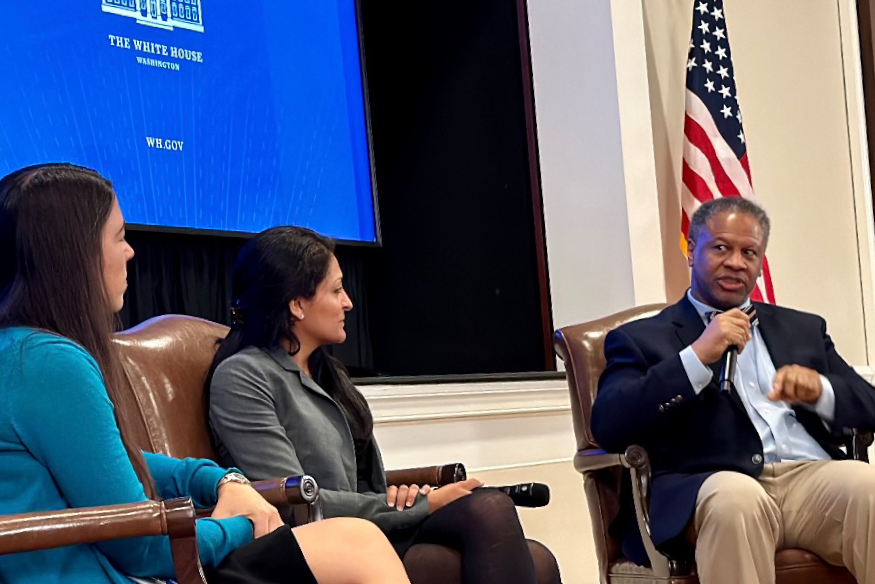Center News & Funding, Community Engagement & Health Equity
Apr 23, 2024
 Massey director Robert A. Winn, M.D., took part in a panel discussion during the White House Minority Health Forum
Massey director Robert A. Winn, M.D., took part in a panel discussion during the White House Minority Health Forum
On Thursday, April 18, leaders from VCU Massey Comprehensive Cancer Center convened with other physicians, researchers and advocates for the White House Minority Health Forum.
Robert A. Winn, M.D., director and Lipman Chair in Oncology at Massey, took part in a panel discussion titled “Access to Care & Social Drivers of Health.”
“How can we use what we already have in place to reimagine what's possible?” Winn asked the panel. “You cannot talk about access without quality. I think those two are linked, and sometimes we have the conversation around access without understanding that quality matters too.”
Winn credited H. Jack Geiger, M.D., and John W. Hatch, DrPH, two founding fathers of community health and social medicine, for building infrastructure in the 1960s. However, Winn said it is now time for today’s medical community to take it to greater levels.

“When we talk about quality, there is getting standard of care, and there's really getting the standard and the access to all the miracles that we have driven from the molecules that become medicine,” Winn explained. “It's not just [patients] getting to the mothership or getting to the shiny academics, [but it’s also] how to more robustly get things out to people.”
Winn added that health systems too often look at community engagement and navigation as activities when there is actually a science to them. He called for an evolution to the 1980s and 1990s models currently in place.
“We think navigation is simply getting you through the health system,” Winn described. “But there is the navigation and crossing that bridge of activating the system for you in the first place.”
Winn shared Massey’s current approach to breaking down more barriers to access.
“We're working in Virginia and at VCU to create a connectedness between what I call community activators and navigators,” Winn said. “One quick example is that with most of our designated cancer centers, if you are a donor or if you are the namesake of their building, you know what you do? You get on the phone, you call somebody, and you activate a system that you then get navigated. Why don't we do that same thing for people who are living in areas of poverty? That's what I'm going to try to be about. That's what we're at least starting.”
Joining Winn for the discussion were Christen Linke Young, J.D., deputy assistant to the President for Health and Veterans Affairs; and Aditi Mallick, M.D., acting director in the Office of Minority Health, Centers for Medicare and Medicaid.
The White House Office of Science and Technology Policy, which hosted the forum, also invited Winn to speak at a closed breakout session, “Addressing Cancer Disparities from Screening to Survivorship.” It included representatives from organizations such as the American Association for Cancer Research, the Leukemia & Lymphoma Society and the National LGBT Cancer Network.

Katherine Y. Tossas, Ph.D., M.S., director of Catchment Area Data Analytics at Massey, was called upon to participate in a breakout session titled “Making Innovation & Research Work for Everyone,” moderated by Catharine Young, Ph.D., and Grail Sipes, J.D., Ph.D. Leaders from agencies, including the U.S. Department of Agriculture, the U.S. Food and Drug Administration and the National Institutes of Health’s National Institute on Minority Health and Health Disparities, contributed to the dialogue on advancing health equity through pioneering research and inclusive policies.
“The discussions underscored the importance of incorporating caregivers into patient-reported outcomes, decentralizing clinical trials to broaden access, utilizing machine learning for adaptive informed consent and tackling nutrition insecurity,” Tossas said. “Additionally, systemic issues like the flawed collection of racial and ethnic data and the critical distinction between data ownership and stewardship were emphasized, especially in the context of historically marginalized and often overlooked groups like Native Americans."
The White House Minority Health Forum aimed to highlight progress and challenges, while bridging connections from the federal level and private sector to improve health outcomes and reduce health inequities. The half-day program was held in recognition of April as National Minority Health Month.
The forum is Massey’s third visit to the White House in the last two years. In 2022, Massey reignited its role in the Cancer Moonshot program under the Biden Administration, with Winn participating in talks at the White House with oncology and health leaders across the U.S.
A portion of the forum, including Winn’s panel, can be viewed by following this link.
Written by: Amy Lacey
Center News & Funding, Community Engagement & Health Equity, Massey 50
Massey Carnival celebrates community, NCI Comprehensive designationMay 15, 2024
Research, Center News & Funding
Kaustubh Datta studies prostate cancer disparities to make a difference in people’s livesMay 13, 2024
Center News & Funding, Massey 50, Clinical
Celebrating 50 years of Massey: From nurse practitioner to patientMay 06, 2024

Treatments in clinical trials may be more effective or have fewer side effects than the treatments that are currently available. With more than 200 studies for multiple types of cancers and cancer prevention, Massey supports a wide array of clinical trials.

Massey supports hundreds of top cancer specialists serving the needs of our patients. Massey’s medical team provides a wealth of expertise in cancer diagnosis, treatment, prevention and symptom management.